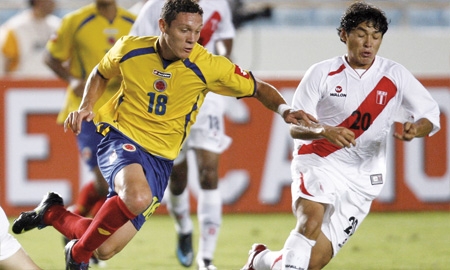The FIFA U-20 World Cup Colombia 2011 will be the 18th edition since FIFA launched its World Youth Championship in 1977. Prepared with a wide selection of tourism offers in addition to the sports event, the Colombian cities involved will offer packages such as history and culture, nature, sun and sand and adventure as part of a ‘Discover Colombia through Soccer’ campaign organized by the country’s investment promotion agency, Proexport.
Host cities include the lively and warm Barranquilla, known for its tropical climate, World Heritage carnival and thriving gastronomic and cultural offer. Barranquilla will kick off the tournament on July 29 with the Brazil-Egypt match, and the first 25 games of the championship will be held there in Colombia’s largest stadium.
The 2011 championship represents the largest sporting event ever hosted by Colombia. “Investment in infrastructure in the stadiums has exceeded $100 million,” says Rodrigo Jose Cobo Morales, director of the FIFA U-20 World Cup.
In addition to Barranquilla, the other host cities are Bogota, Cali, Medellin, Pereira, Cartagena, Manizales, and Armenia.
Well known for its musical heritage, Cali boasts a long tradition of various musical styles, including merengue, vallenato, currulao, meneito, reggaeton and latin jazz. Since the 1990s, however, it is the global capital of salsa, with more than 8,000 dancers and 50 dance schools, and the city’s streets are alive with Caribbean beats.
THE OFFICIAL MASCOT FOR THIS YEAR’S FIFA U-20 WORLD CUP IS
THE RED MACAW, ONE OF SOUTH AMERICA’S MOST COMMON PARROTS
THE MASCOT’S WIDE SMILE AND ATHLETIC STANCE REFLECT THE JOIE DE VIVRE OF THE HOST NATION
‘INVESTMENT IN INFRASTRUCTURE IN THE STADIUMS HAS EXCEEDED $100 MILLION’
‘A GREAT LEGACY TO LEAVE IS THAT THE WHOLE WORLD WILL SEE COLOMBIA WITH DIFFERENT EYES’ |
Cartagena de Indias, with its romantic cobbled streets and colonial architecture, is sure to delight visitors. Meanwhile the nation’s capital Bogota, which the New York Times named one of its ‘31 Places to Visit in 2010’, reflects the emerging modern urban face of Colombia’s transformation with its office towers, parks and ample choice of hotels, shopping and cultural exhibits.
Medellin, Colombia’s second-largest city, is a busy commercial and industrial hub with lively nightlife. It is also a global fashion hub due to the region’s thriving textile industry and boasts a number of excellent Colombian designers. Finally, the Coffee Triangle of Manizales, Armenia and Pereira is a verdant and prosperous region, with majestic landscapes dotted with coffee plantations and a number of options for nature tourism.
Expected to attract more than 350,000 visitors – by early May of this year, 250,000 tickets had already been sold – President Santos has promised the 52-match tournament will be the best in its 34-year history.
During the April draws, the President said, “We will all continue to work hard so that through this sports event the whole world realizes how wonderful this country is.”
Since it was chosen in 2008 as host country for this year’s event, beating neighboring competitor Venezuela, Colombia’s Soccer Federation and its federal government, through an inter-institutional commission, have implemented a comprehensive work plan to ensure the event’s success and a quality tournament.
“The most important legacy after the World Cup is over is the culture of watching football live without nets, safe, and with the whole family,” says Mr. Cobo Morales. "Football is a phenomenon which manages to unite people, nations, and if used as a weapon to pacify the world it would surely be the most effective of all.”
Measures taken include a solid national security plan, specially designed for the event, which will ensure the safety of Colombians and foreign visitors both in and out of the stadiums. More than 56,000 uniformed officers will patrol the stadiums, training grounds, hotels, restaurants and streets of the host cities. In addition, a special World Cup elite commando unit has been created that comprises dozens of security groups expressly trained to deal with exceptional circumstances, such as natural disasters and terrorist acts. Indeed, in recent pre-tournament inspections, Colombia was given the thumbs up by FIFA representatives, who said that overall the country was well prepared for the event.
“What is amazing about football is the binding effect it causes: if we take 10 people from very different countries, who do not speak the same language and are not governed under the same social rules, and give them a ball, they won’t take 10 minutes to set up a game in which everyone understands perfectly the rules. That’s the magic of football,” says Fernando Panesso, manager of World Cup U-20. “Apart from the infrastructure created for the event, a great legacy to leave is that the whole world will see Colombia with different eyes.”

0 COMMENTS